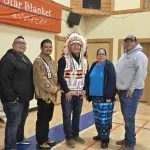
Sharing the Land – Incorporating Indigenous Values
Indigenous worldviews are embedded in the spiritual, the same way they are embedded in the physical, mental and emotional. The life and way of being for an Indigenous person cannot be compartmentalized into sections, partitioned off when they participate in this or that activity.
If that occurs, then the Indigenous worldview, values, and cultures are being eradicated.
This is what Justice Murray Sinclair, and all reconciliation reports warn of, to be on guard for, cultural genocide.
Eva Marie Garroutte, speaking on radical Indigenism, says “It takes the stand that if the spiritual and sacred elements are surrendered, then there is little left of our philosophies that will make any sense.”
There is a relational component to being Indigenous that is reflected in how these worldviews were created, from interaction with the surroundings.
For businesses, they need to take Indigenous worldviews into account when constructing the values and viewpoints their company will have in Indigenous territories.
This begs the question, is the way most non-Indigenous companies do business the only way to structure business practices?
Is it exclusionary of the values within Indigenous worldviews?
Let’s start looking closer at Indigenous worldviews and how they can impact business concepts.
I will examine three Indigenous values and what they can offer to business solutions.
Oral tradition is the process of knowledge being passed on or changed via practice, and not just through written documentation. Oral tradition was the way Indigenous communities continued their teachings, history and education, one to another, generation to generation.
This runs contrary to how businesses pass knowledge on, which is via documents of policy and procedure, which are generally hard to change even with better practical knowledge on a subject.
Those same documents tend to override human compassion, in favor of keeping those rules intact. Indigenous knowledge thinks about the human factor inside of the teachings, which makes room for adaptation.
Human beings are part of a bigger ecosystem, where all things are equal including land, water, atmosphere, and animals. Indigenous people know all these are interconnected, like family, and help to replenish the world we live in.
Businesses must include a focus on sustainability of the lands they affect, as these lands are shared by so many for their life’s fulfillments. A company cannot act like this is replaceable because they have no plan for staying for generations.
Indigenous views on wealth do not focus on money, they are about relationships and care for the community.
Businesses reward in a monetary manner.
Businesses must expand their focus concerning social responsibility, and what that can mean.
What are companies giving back to communities in the way of relationship building?
How are companies helping to support families and community development through reward systems?
There is so much more depth to Indigenous worldviews, mostly experienced through lived interactions, that we have not examined. I have only touched on an inkling of those value systems. I will examine these solutions in more depth in the coming months

